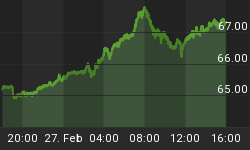Russia's central bank recently warned about the growing financial risks to the Russian economy from Saudi Arabia encroaching upon its traditional export market for crude oil. Russia sends 70 percent of its oil to Europe, but Saudi Arabia has been making inroads in the European market amid the oil price downturn.
The result is a heavier discount for Russia's crude oil, the so-called Urals blend. Bloomberg reported that the Urals typically lands in Rotterdam, a major European destination, at a discount to Brent of around $2 or less. But the discount has widened to $3.50 lately due to increased competition from Saudi Arabia. "Oil supplies to Europe from Saudi Arabia are probably adversely affecting Urals prices," the Russian central bank warned in a recent report.
Russian officials have accused Saudi Arabia of "dumping" its oil in Europe, a move that Rosneft chief Igor Sechin said would "backfire."
Russia's economy has been battered by the collapse in crude prices, compounded by the screws of western sanctions. The Russian economy could shrink by 3.2 percent this year.
Oil exports account for around half of the revenue taken in by the Russian government. And for an economy so dependent on oil, it is no surprise that the plummeting crude oil price has led to a dramatic depreciation of the ruble, although over the past month the currency regained some lost ground. The weakening currency has pushed up inflation, which creates a conundrum for the Russian central bank.
To stop the ruble from plunging further and to keep inflation from spiraling ever upwards, the Russian central bank took aggressive action by hiking interest rates to as high as 17 percent at the beginning of 2015. However, that has negatively impacted the economy. As the ruble stabilized, the bank dialed the interest rate back to 11 percent, where it stands today.
In response to the tough financial circumstances that Russia has found itself in, it sees no choice but to squeeze as much oil out of its aging fields as it can. So far, it has succeeded to some extent. Russian oil production is expected to rise by a modest 70,000 barrels per day in 2015, averaging 10.75 million barrels per day (mb/d) over the course of this year. Output hit a post-Soviet record of 10.78 mb/d in October, according to OPEC's latest monthly report.

However, the upside to Russia's oil production is limited. The Russian government needs revenue, so is not keen to cut taxes. The government is mulling a delay in the planned cut in export taxes, which, according to OPEC, could result in oil companies paying an additional $2 to $3 billion more in taxes. That could modestly cut into overall Russian oil production, perhaps pushing output down by 0.1 to 0.2 mb/d. In any case, Russia probably can't boost output any further. OPEC predicts Russia's oil production will remain flat through next year.
Globally, the competition between oil exporters won't ease in the near term. There are still too many barrels of crude floating around. OPEC predicts that non-OPEC supply will contract by just 0.13 mb/d in 2016, a rather trivial amount considering the extreme cut backs in investment and drilling activity.
Despite the fact that OPEC officials have consistently put on a brave face in public, insisting that markets will balance relatively quickly, OPEC's numbers tell a different story. The cartel sees U.S. shale contracting by just 100,000 barrels per day in 2016 from 2015, a volume that is nearly offset by several new projects beginning operations in the Gulf of Mexico.
Which brings us back to Europe. Saudi Arabia could be playing a longer game, intensifying its market share strategy by encroaching on Russia's traditional market in Europe. An increase in Saudi oil flowing to Europe threatens to undermine Russia's principle market. In its November report, OPEC reported that the Urals discount to Brent "almost tripled in October amid plentiful supplies, sagging refinery margins and wide availability of alternative grades from the Middle East."
Article Source: http://oilprice.com/Energy/Crude-Oil/Saudis-Planning-For-A-War-Of-Attrition-In-Europe-
By Nick Cunningham of Oilprice.com















